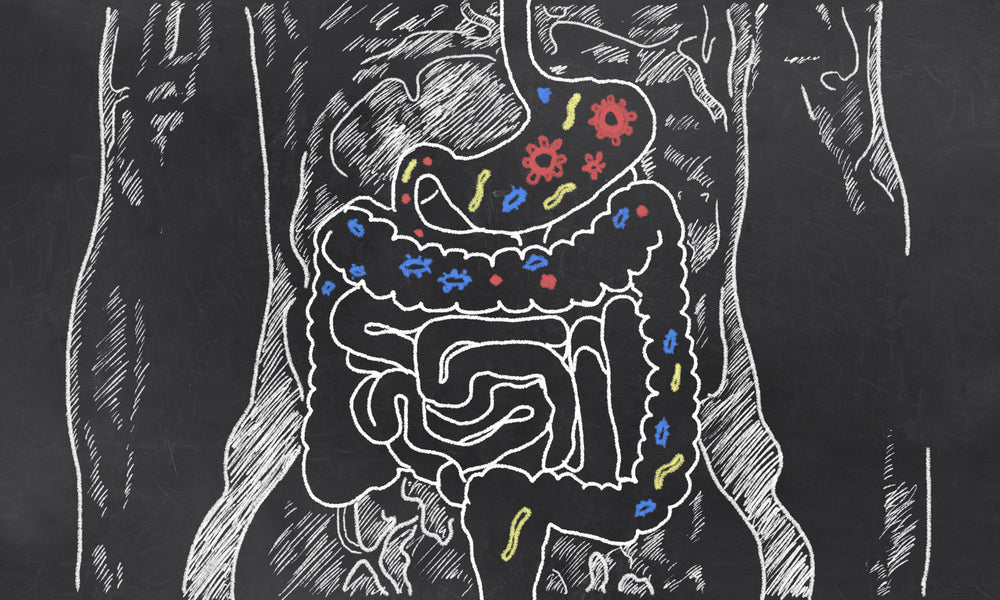Your cart is empty
Free shipping on all US orders


Free shipping on all orders

The gut microbiome, a term that might sound complex at first, refers to the vast community of microorganisms living in our digestive systems. This includes bacteria, viruses, fungi, and other microscopic life forms. Interestingly, the types and quantities of these microorganisms can significantly affect not only our digestion but also our overall health, mood, and even physical fitness.
See, the gut microbiome plays a crucial role in digesting the food we eat. Some foods, especially those high in fiber, cannot be broken down by our bodies alone. This is where our microscopic companions come into play, helping to break down these foods and allowing us to absorb essential nutrients.
So how does this all related to fitness? A well-functioning gut microbiome supports the body's metabolism, aiding in the efficient use of energy from food and contributing to better physical performance and recovery from exercise.
Let’s take a deeper look at the role of role of the gut microbiome and how we can support their healthy function.
The gut microbiome, a complex and dynamic ecosystem within our digestive system, is home to trillions of microorganisms, including bacteria, viruses, fungi, and other microscopic life forms. Among these, bacteria are the most studied and understood.

This community of microorganisms coexists with us in a symbiotic relationship, meaning both we and they benefit from each other. You may have heard about some of them but are not sure how beneficial they are. Let’s quickly talk about that.
The gut microbiome is dominated by two main bacterial phyla: Firmicutes and Bacteroidetes. Other significant but less abundant groups include Actinobacteria and Proteobacteria. Each of these groups plays a unique role in our gut ecosystem.
The connection between the health of your gut and your physical fitness might not be the first thing that comes to mind when you think about exercise or nutrition. However, it turns out that the tiny organisms living in our digestive system play a significant role in how we feel, perform, and even recover from physical activity.

Firstly, let's understand that these microscopic inhabitants are not just passive residents; they actively help in breaking down the food we eat, turning it into energy that our bodies can use. This process is crucial for keeping us energized, especially during physical activities.
That’s why one of the key benefits of a healthy gut is its impact on our body's metabolism. This means that with a well-functioning gut microbiome, our bodies can more efficiently convert food into energy.
his not only boosts our energy levels but also enhances our endurance and performance, whether we're running, swimming, biking, or engaging in any other form of exercise.
A healthy gut microbiome also helps manage inflammation in our bodies. Inflammation is a natural response to exercise-induced muscle damage, but too much inflammation can lead to prolonged muscle soreness and delayed recovery times.
By keeping our gut in good shape, we can help control inflammation, reduce muscle soreness, and speed up our recovery, allowing us to get back to our training routines sooner.
Understanding the connection between our gut health and mood involves exploring the fascinating gut-brain axis. This term refers to the complex communication network that links the gut and the brain.
It's a two-way street: not only does our brain send signals to our gut, but our gut also communicates directly with our brain. Ever noticed how anxiety causes a nervous gut? This axis is the reason.

This relationship is crucial in understanding how our digestive system's health can significantly impact our mental well-being.
A healthy gut is rich in beneficial bacteria, which play a vital role in producing and regulating mood-related neurotransmitters. Neurotransmitters are chemical messengers that the brain uses to communicate with different parts of the body.
Among these, serotonin and dopamine are crucial for mood regulation. Interestingly, a large portion of serotonin, often referred to as the "feel-good" neurotransmitter, is actually produced in the gut.
This means that the state of our gut health can directly influence the production and balance of these mood-regulating chemicals.
When our gut health is compromised, the balance of good and bad bacteria can be thrown off. This imbalance can lead to decreased production of important neurotransmitters, contributing to mood disorders such as anxiety and depression.
An unhealthy gut can even trigger an immune response leading to inflammation, which has also been linked to various mental health issues.
Dysbiosis refers to an imbalance in the gut microbiome, where harmful microorganisms outnumber the beneficial ones. This imbalance can lead to various health issues, including:
- Irritable Bowel Syndrome (IBS): Characterized by chronic abdominal pain, bloating, and altered bowel habits.
- Inflammatory Bowel Disease (IBD): Including Crohn's disease and ulcerative colitis, conditions that cause chronic inflammation along segments of the gastrointestinal tract.

- Obesity and Metabolic Disorders: Emerging research links dysbiosis to increased risk of obesity, type 2 diabetes, and other metabolic conditions.
- Mental Health Disorders: Dysbiosis is also being explored for its potential connection to anxiety, depression, and other mental health issues.
We’ve established that a balanced gut microbiome is essential for maintaining health. Two key components that support a healthy gut microbiome are prebiotics and probiotics. Prebiotics are special types of dietary fiber that feed the beneficial bacteria in the gut. Probiotics, on the other hand, are live bacteria found in certain foods that can add to the population of healthy microbes in our digestive system.
Incorporating foods rich in prebiotics and probiotics into your diet is an effective way to promote gut health. Examples include yogurt and kefir, which are fermented dairy products packed with probiotics.
These can help increase the diversity and number of beneficial bacteria in the gut. High-fiber fruits and vegetables, such as bananas, berries, asparagus, and leafy greens, are excellent sources of prebiotics. They not only support gut bacteria but also contribute to overall digestive health.
Even better yet, dietary supplements such as our Field Of Greens superfood powder can offer a convenient way to consume a blend of prebiotic and probiotic ingredients, along with a variety of nutrients from fruits and vegetables. We do recommend that whole foods should remain the foundation of a gut-friendly diet, but well-timed supplemental intervention can help with optimizing the microbiome.
Experimenting with fermented foods, such as sauerkraut or kombucha, can also introduce more varied probiotics into your diet. Remember, a gradual introduction of these foods can help your digestive system adjust without discomfort- do not try to flood your gut with numerous sources at once.
Improving gut health is not solely about your dietary choices. There are several lifestyle strategies that can significantly enhance the wellbeing of your digestive system and by extension, the microbiota. These include::
Regular, moderate intensity exercise can have a positive effect on gut health. This includes activities that are as simple as brisk walking, cycling, swimming, and yoga. Incorporating resistance exercise is also helpful, especially as it relates to optimizing metabolic rate in the long term.
These exercises and many others are beneficial because they help increase the diversity of the microbiome. A diverse microbiome is associated with a stronger gut barrier, which can prevent harmful pathogens from entering the body and causing illness.
One of the ways exercise promotes a healthy gut is by stimulating the production of short-chain fatty acids (SCFAs) by the gut bacteria. SCFAs are compounds that provide energy to the cells lining the intestines, helping to reinforce the gut barrier and reduce inflammation. Moderate exercise increases the abundance of beneficial gut bacteria that produce SCFAs, thus enhancing gut health.
It's also important to note that while moderate exercise is beneficial, excessive physical activity can have the opposite effect, potentially leading to gut issues. Intense, prolonged exercise without adequate rest can stress the body, leading to an imbalance in gut bacteria and a weakened gut barrier. Therefore, finding a balance in the intensity and duration of exercise is key to reaping the benefits for gut health.
Sure, focusing on the health of your gut might not be the fanciest thing to do, but the extent of its effects is remarkable. Medical science is still somewhat behind the times when it comes to holistic health, with very few practitioners advocating for microbiome health as opposed to empirical antibiotic shotgun therapy.
The result is worsened microbiota balance and ill health as a consequence. Start by making small changes- this could mean a little more fiber, committing to getting a bit more sleep, or taking stress in stride.
One thing is clear- there is much at stake regarding the health of these bacteria;do not neglect them.